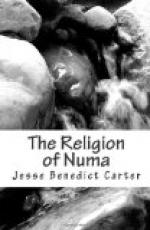During this second century before Christ, therefore, the state religion was apparently unchanged so far as the outward form was concerned. The terminology and the ceremonies were much the same as before, but the content was quite different: Greek gods and Greek ideas had displaced Roman gods and Roman ideas, and the official representatives of religion, the state priests, were carrying the whole burden of worship on their own shoulders, because popular interest had been in the main deflected and was working along other lines. These lines of rival interest were superstition and scepticism, phenomena which at first sight appear as distinct opposites, but which are on the contrary very closely akin, so that they usually occur together not only in the same age, but frequently even in the same individual. They are purely relative terms, and the essence of superstition consists in its surplus element, just as the essence of scepticism lies in its deficiency. No religion judged from the standpoint of the worshipper can properly be called a superstition, but if once we can establish the essential things in a religion, then any large addition to those essential things savours of superstition. Speaking with historical sympathy we have no right therefore to designate early Roman religion as a superstition—it may of course be relatively so in comparison with other religious forms—but once we have established the essential elements in that early religion, we may consider the introduction of new and entirely different elements as superstition. The old religion of Rome consisted in the exact and scrupulous fulfilment of a large number of minute ceremonials. The result of this careful fulfilment of ritual was that the powers around man did him no harm but rather good, and that was the end of the whole matter. Religion did not command or even permit special inquiries into these powers; it was not only not man’s duty to try to know the gods, it was his positive duty to try not to. Through the influence of Greece there had now come into Rome an altogether new idea, nourished largely by the Sibylline books, and represented most fully in the Magna Mater, the idea of the perpetual service of a god, a consecration to him, to the exclusion of all other things, and a life given over to the orgiastic performance of cult acts, which produced a state of ecstasy and consequently a communion with the deity. Along with this there went a belief in the possibility, by means of certain books and certain men, of obtaining from the gods a knowledge of the future. It is these surplus beliefs, quite contrary to the spirit of old Roman religion, which may justly be called superstition.




